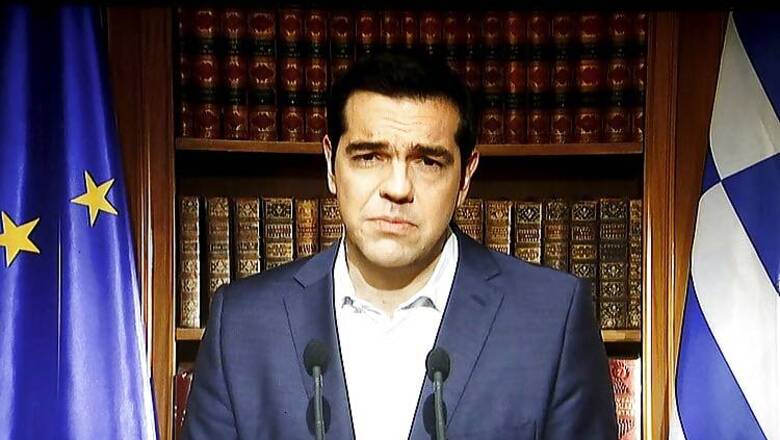
views
Athens: A defiant Prime Minister Alexis Tsipras urged Greeks on Wednesday to reject an international bailout deal, wrecking any prospect of repairing broken relations with European Union partners before a referendum on Sunday that may decide Greece's future in Europe.
Less than 24 hours after he wrote a conciliatory letter to creditors asking for a new bailout that would accept many of their terms, Tsipras abruptly switched back into combative mode in a television address.
Greece was being "blackmailed", he said, quashing talk that he might delay the vote, call it off or urge Greeks to vote "Yes".
The remarks added to the frantic and at times surreal atmosphere of recent days in which acrimonious messages from the leftist government have alternated with late-night offers of concessions to restart negotiations.
A day after Greece became the first developed economy to default on debt to the International Monetary Fund, long lines at cash machines provided a stark symbol of the pressure on Tsipras, who came to power in January vowing to end austerity and protect the poor.
"A 'No' vote is a decisive step towards a better agreement that we aim to sign right after Sunday's result," he said, rejecting repeated warnings from European partners that the referendum would effectively be a vote on whether Greece stays in the euro or returns to the drachma.
European Council President Donald Tusk retorted in a tweet: "Europe wants to help Greece. But cannot help anyone against their own will. Let's wait for the results of the Greek referendum."
Euro zone finance ministers held an hour-long conference call to discuss the previous night's offer from Tsipras, but were adamant that no further discussions would be held until after Sunday's vote.
"We will come back to your request for financial stability support from the ESM (European Stability Mechanism) only after, and on the basis of the outcome of, the referendum," the head of the currency zone ministers' Eurogroup, Jeroen Dijsselbloem, wrote in a letter to Tsipras.
IMF Managing Director Christine Lagarde told Reuters in an interview that she would want to see reforms before opening discussions on any new debt package.
Global financial markets have reacted remarkably calmly to the widely anticipated Greek default, strengthening the hand of hardline euro zone partners who say Athens cannot use the threat of contagion to weaker European sovereigns as a bargaining chip.
In his overnight letter to creditors, seen by Reuters, Tsipras agreed to accept most of their demands for taxes and pension cuts and asked for a new 29 billion euro loan to cover all debt service payments in the next two years.
However, even if negotiations do restart after the referendum, Germany and others made clear that any talks on a new programme would have to start from scratch with different conditions.
The exasperated tone to public comments of European leaders exhausted by the chaotic turnarounds of the past few days offered little hope of a breakthrough.
Tsipras has suggested he would step aside if Greeks vote "Yes" in Sunday's referendum.
PENSIONERS SUFFERING
"This government has done nothing since it came into office," German Finance Minister Wolfgang Schaeuble said in a speech in the lower house of parliament in which he accused Athens of repeatedly reneging on its commitments.
"You can't in all honesty expect us to talk with them in a situation like this," he said.
French Finance Minister Michel Sapin, among Greece's strongest sympathisers in the euro zone, told RTL radio, "The aim is to find an agreement before the referendum if possible ... But it's dreadfully complicated."
Lagarde declined to be drawn out on whether she viewed Tsipras was a reliable negotiating partner after his latest switch, although she did say the Fund wanted to see evidence of reforms before talks about any new potential debt package.



















Comments
0 comment